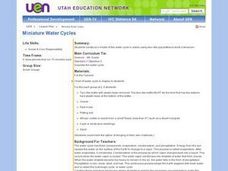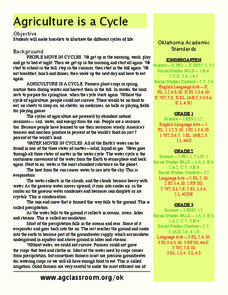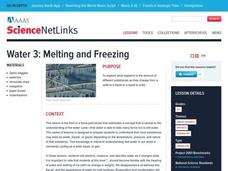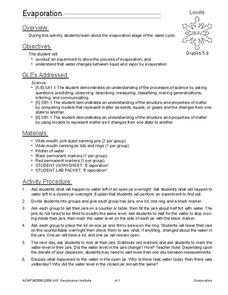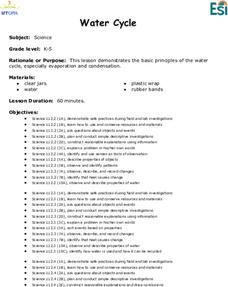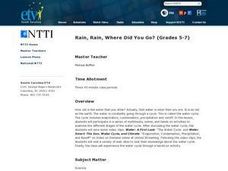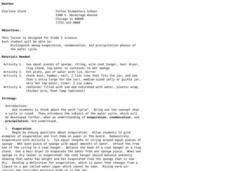Curated OER
It's Clean, Fresh and only Three Billion Years Old - Water!
Students engage in a lesson plan which explores the wate cycle. They get to see some very entertaining video, do fun hands-on activities and gain a better understanding of evaporation, condensation, precipitation and collection.
Curated OER
A Study of Your Domestic Water Supply
Young scholars create a diagram that traces the path of a raindrop from its source into the water supply for their house and back to the environment. They also diagram the processes that occur in a sewage treatment and water treatment...
Curated OER
Miniature Water Cycles
Fourth graders create a biome of their choosing in a terrarium. Terrariums are observed and results recorded daily for 2 weeks. They observe/record changes in the water within their terrarium and use the data to write sentences...
Curated OER
Does the Sidewalk Drink Puddles?
Students participate in an experiment about evaporation. In this water cycle instructional activity, students use water, thermometers, and measuring tools to make a puddle and measure the size four times throughout the day. Students...
Curated OER
THE WONDERFUL WATER CYCLE
Students are introduced to the processes of evaporation and condensation as they observe physical changes in water. They observe how matter changes from a solid to a liquid state. Students are explained that steam is water in its gaseous...
Curated OER
Agriculture is a Cycle
Students explore cycles in nature. In this cross curriculum agriculture lesson, students define "cycle" and research weather and planting folklore. Students make a bracelet in which individual colored beads represent the many "cycles" of...
Curated OER
Melting and Freezing
Learners explore how various substances change from a solid to a liquid or from a liquid to a solid and how temperature, pressure and nature play an important role in this process. In this melting and freezing instructional activity,...
Curated OER
The Cool Forms of Water
Students discover the different forms of water on Earth. In this states of water lesson, students read material on the different forms of water and how they are created. The students answer written questions on worksheets.
Curated OER
Water, Water, Everywhere and Always on the Move
Students create their own water cycle in a terrarium. In this water cycle lesson, students research the water cycle and complete a worksheet using the Internet. They create a water cycle of their own in a jar with stones, sand, soil, and...
Curated OER
Earth's Hydrologic Cycle
Students examine the water cycle. In this hydrologic cycle lesson, students follow the provided procedures to demonstrate the how water moves around the planet through the dynamics of the water cycle.
American Chemical Society
Why Do Puddles Dry Up?
Bring evaporation right into the hands of young scientists with an entertaining, hands-on activity. Investigators view videos and images while participating in class dialogue focused on water evaporating from surfaces. A short experiment...
Curated OER
Evaporation Introductory Lesson
Fourth graders examine the concepts of evaporation and the water cycle. They describe the relationship between heat energy, evaporation and condensation of water on Earth and identify the sun as the source of energy that evaporates...
Curated OER
Evaporation
Students study the evaporation stage of the water cycle. For this water cycle lesson, students participate in an experiment to study the process of evaporation that uses jars and water. Students complete an observation worksheet for the...
Curated OER
Water Cycle
Students perform experiments with water to observe the principles of evaporation and condensation. They make models of the water cycle and discuss the processes that occurred in their experiments with their jars of water.
Curated OER
The Water Cycle
Fifth graders examine the stages of the continuous water cycle that exists on Earth. They observe a water cycle model that is set up in the classroom and write descriptions of what they see. As a class, they discuss models of the water...
Curated OER
Water and Ice
Learners explore water and how it changes forms. In this investigative lesson students participate in an activity that shows them how water changes form and what it looks and feels like.
Curated OER
Rain, Rain, Where Did You Go?
Students study the water cycle including condensation, evaporation, and precipitation. In this water cycle lesson, students watch a video and access assigned web sites to investigate the water cycle. They complete an experiment with a...
Curated OER
Weather
Fifth graders study the water cycle. In this science lesson plan, 5th graders distinguish among evaporation, condensation, and precipitation phases of the water cycle.
Curated OER
Condensation
Students participate in the scientific process to investigate what happens to water when it evaporates by observing condensation. In small groups they observe what happens to ice in a cup, and what occurs when they hold a bowl of ice...
Curated OER
Rain On
Fourth graders explore evaporation and condensation. In this water cycle lesson, 4th graders investigate their surroundings for real-life examples of evaporation and condensation. Students conduct various experiments.
Curated OER
Rain On
Fourth graders study the water cycle and clouds. In this water cycle and cloud lesson, 4th graders determine the definition of condensation and watch a demonstration in which the teacher makes a cloud in a bottle. They discuss the water...
Curated OER
'Round and 'Round it Goes!
Students discuss and interpret background knowledge on poster copy given on the water cycle. Students complete the included activity sheets using the poster as a reference in small groups. Students identify and name where water can be...
Curated OER
Clouds
Students explore clouds. In this weather lesson, students identify the steps in the water cycle, define condensation and evaporation, and relate this information to cloud formation. Students perform a cloud experiment, predict weather...
Curated OER
THE INCREDIBLE JOURNEY
Learners describe the movement of water within the water cycle and identify the states of water as it moves through the water cycle.




